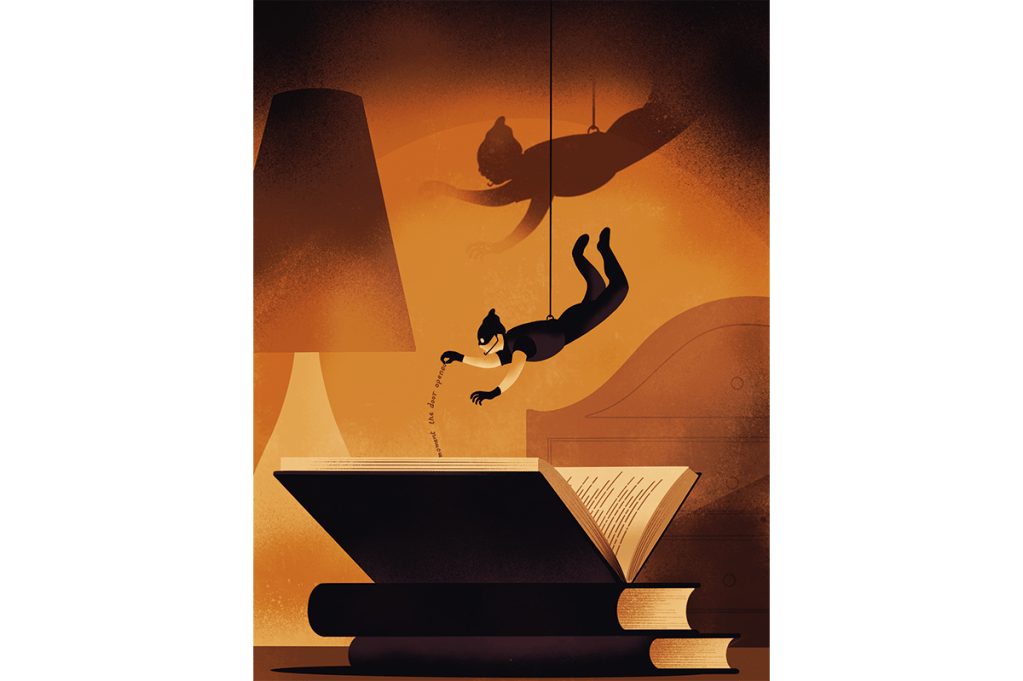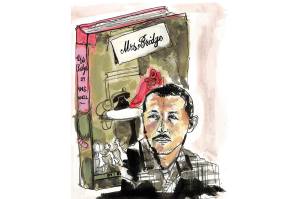T.S. Eliot once made the significant point, in an essay on Philip Massinger, that “Immature poets imitate; mature poets steal; bad poets deface what they take, and good poets make it into something better, or at least something different.” Eliot knew exactly what he was talking about (himself). However, change “poets” to “novelists” and the same pertinence applies. In fact, this wholesale, covert purloining may be true of all artists in all ages in all the seven arts.
Let’s start with some backstory. Evelyn Waugh (1903-66), as they say, needs no introduction. William Gerhardie (1895-1977) is almost wholly forgotten today, but in the 1920s he was the luminous young wunderkind of English literature — a kind of Donna Tartt or Sally Rooney of his times. He was the young writer to watch and had known tremendous success with his debut novel, Futility (1922), lavishly praised by Edith Wharton, and its follow-up, The Polyglots (1925).
Graham Greene, Anthony Powell, Olivia Manning, Katherine Mansfield and many others later testified to the impact that reading his early novels made on them. Evelyn Waugh was no exception. In a letter written later in life when Gerhardie had hit hard financial times and the literary world was getting up a collection of funds for him, Waugh sent in his check and added: “As you no doubt recognized, I learned a great deal of my trade from your own novels.” Waugh read Gerhardie when an undergraduate at Oxford — Waugh’s first novel, Decline and Fall (1928), was very Gerhardian. In the 1930s Waugh admitted to a mutual friend, “I shall never be as good as he. I know I have great talent, but he has genius.”
As a near obsessive reader of Waugh’s work and as someone with an intense curiosity about the man he was, I found these admissions — these confessions — both surprising and revelatory. Waugh was not the sort of person to consign himself happily to second place, and I felt there must be a clue to the formation of his particular tone of voice and the Wavian view of the human condition in this oblique and very unusual praise. It wasn’t Waugh that took me to Gerhardie, but as I read my way through Gerhardie’s many novels, particularly the early ones, I was repeatedly struck by how closely Waugh’s sense of humor and his take on life resembled Gerhardie’s. It seemed to me that a more forensic examination of the older writer’s influence on his younger contemporary might be worthwhile.
I decided to look closely at two books published not far apart: Gerhardie’s third novel, Jazz and Jasper (1928), and Waugh’s second, Vile Bodies (1930). Jazz and Jasper is an oddity. It was commissioned as a serial by Lord Beaverbrook (a great champion and new friend of Gerhardie) and designed to run in the Daily Express. It never did, in fact, though Beaverbrook paid Gerhardie the $350 he promised (about $25,000 today). When the book eventually appeared as an orthodox novel it was something of a success, but not an overwhelming one. It’s a measure of Gerhardie’s fame at the time that the cover of the first edition was simply a portrait of the author’s face. It’s hard to imagine that happening today — let alone ever — for a new work of fiction.
The book’s subtitle is “The Story of Adams and Eva” and refers to the pursuit of the central female figure, the intensely alluring but maddening Eva Kerr, by three suitors: Frank Dickin, a young author who resembles Gerhardie; Lord Ottercove, a newspaper magnate (heavily based on Beaverbrook); and a malevolent, evangelical scientist called Lord Chris de Jones. The novel is set in the present day of the 1920s — the world of high society and “Bright Young Things” — but has a distinctly fantastical feel to it. Lord Ottercove has a car that can take to the air. Chris de Jones is plotting to bring about the end of the world — in a bizarre mix of nuclear science and Einsteinian physics — by stopping up the world’s volcanoes. He succeeds in his aims, and the novel ends apocalyptically. The earth and its inhabitants dematerialize, with only a small colony of survivors left on a detached mountaintop in Austria — including Frank and Eva — that miraculously reconfigures itself into a tiny globe: a microcosm of the earth with weaker gravity.
What is memorable and enjoyable about the novel is not this surreal subplot but the amorous goings on between Frank, Eva and Ottercove. This is drily amusing and exhibits Gerhardie’s unique, deadpan voice. His literary ambition, he claimed, was to explore the “humorous tragedy” of the human condition, and he does this through what I would call the Comedy of Frustration and the Comedy of Illogic. This is what, I believe, drew Waugh to Gerhardie. This was the voice he responded to. And imitated.
Vile Bodies is also a novel about Bright Young Things and the newspaper world. Its hero, Adam Symes, is another novelist. He becomes a gossip columnist for the Daily Excess and for most of the novel is involved in an on-off pursuit of the delectable Nina Blount. It, too, ends with an apocalypse — a proto-nuclear global war that devastates the earth. In Vile Bodies the newspaper magnate is called Lord Monomark. In the original manuscript — and this is the great giveaway of Waugh’s debt to Gerhardie — the magnate was actually named Lord Ottercove. Waugh was persuaded to change the name by his publishers. That Waugh was prepared to “lift” his character’s name from Jazz and Jasper is extraordinary — rather as if Dickens, after the publication of Vanity Fair, introduced a character called Becky Sharp into Dombey and Son.
Throughout Vile Bodies, the echoes of Jazz and Jasper are everywhere apparent. Agatha Runcible’s plaintive cry in Vile Bodies of “Faster, faster!” is exactly the same as Lord Ottercove’s in Jazz and Jasper. Lord Monomark’s omnipotence — “Get me the Home Secretary!” — is identical to Lord Ottercove’s overweening power in control- ling government and ousting prime ministers.
But the really telling similarities are more generic than these simple borrowings. Young writers very often respond to the voices of other writers rather than their themes and subject-matter. And sometimes writers emerge who have developed a new, distinct voice that is then widely imitated. Günter Grass, J.D. Salinger, Ernest Hemingway, Muriel Spark, Vladimir Nabokov, Saul Bellow, Angela Carter and Martin Amis are good examples of this kind of innovation. The voice they write in — and it’s more than simple “style,” I believe — is what contributes to their legion of imitators. This is exactly how I want to speak to my readers, the young writer thinks — and then proceeds to echo that voice in his or her own work. This is, I think, precisely what happened when Evelyn Waugh read Gerhardie for the first time.
I don’t have the space to give many instances, but here are two sets of quotations that go some way to proving my point. First, dialogue. Gerhardie’s is rapid-fire and naturalistic:
“But I was alone, in bed, reading a novel and eating chocolates and waiting.”
“Waiting?”
“For you, darling.”
“Oh, darling!”
“And who paid?”
“She paid.”
“Rather generous of her.”
“But she took it all out of my savings bank at the post office.”
“Oh! how mean! How cruel!”
And this is Waugh:
“Nina, darling, are you awake?”
“Well, I wasn’t…”
“Listen, do you really want me to go and see your papa today?”
“Did we say you were going to?”
“Yes.”
“Why?”
“To say we could be married now I had a job.”
“I remember… Yes, go and see him, darling. It would be nice to be married.”
I could have chosen a dozen more examples, pretty much at random. Gerhardie’s dialogue in Jazz and Jasper and Waugh’s in Vile Bodies seem frequently interchangeable.
More significant, however, is the sense of humor that operates throughout both novels. This reflects what Gerhardie calls the “humorous tragedy” of the human condition. The outlook is Chekhovian (Chekhov famously subtitled The Cherry Orchard “a comedy”). Gerhardie, who was born in Russia, spoke fluent Russian and read Chekhov in the original, was a passionate admirer of the writer and published a superb short book on him in 1928. It is still as good an introduction to Chekhov and the Chekhovian effect as you will find, and Gerhardie, writing in English, of course, transposed and introduced this clear-eyed, non-judgmental Chekhovian comedy and point of view into twentieth-century English literature. It was very appealing to Waugh; it obviously chimed very closely with something in his own nature. Here is Gerhardie:
[Frank] sat down on a bench and a nasty little girl of ten or so disengaged herself from a group of urchins and sat down between him and an old lady and began to tease him, pointing at him with her dirty forefinger. “You funny-looking bloke, you. Now why don’t you smile?” And all the other urchins crowded round and giggled at him. “Come on! Let’s see a smile.” The girl went on, encouraged…
“Shut up, will you!” suddenly Frank roared at her.
Here is Waugh:
Adam rang the bell and waited. Nothing happened. Presently he rang again. At this moment the door opened.
“Don’t ring twice,” said a very angry old man. “What do you want?”
“Is Mr. Blount in?”
“There’s no Mr. Blount here. This is Colonel Blount’s house.”
“I’m sorry… I think the Colonel is expecting me to luncheon.”
“Nonsense. I’m Colonel Blount.” And he shut the door.
This is a kind of deadpan absurdist — yet entirely naturalistic — comedy that was new in English literature. It had its first flowering in the work of William Gerhardie and was seized upon and elaborated by Evelyn Waugh. It has become, since then, almost ubiquitous — it is almost the defining tone of the British comic manner, and not just its manifestation in fiction (both of the extracts could easily be imagined as Monty Python skits, for example).
Jazz and Jasper is not a wholly successful novel — the parts are greater than the whole. Indeed, the same unevenness is apparent in Vile Bodies. Waugh’s debt to Gerhardie is most apparent in his masterpiece, Scoop — a near-perfect comic novel about a young man’s quest for an impossible and flighty love-object and a hilarious parable of the world of newspapers and journalism.
Waugh’s monstrous newspaper magnate Lord Copper of the Daily Beast owes everything to Gerhardie’s Lord Ottercove in Jazz and Jasper to an almost plagiaristic degree — the ego, the mannerisms, the figures of speech, bold antithesis presented as confident, unanswerable logic and so on. But Scoop is a novel that reaches a standard of excellence that Gerhardie never managed to achieve.
Gerhardie possessed as eccentric and formidable a personality as Waugh’s. He did not suffer fools. In fact, an author’s antipathies can often be as revealing as his likes. To cite one example: Gerhardie was not an admirer of Virginia Woolf. By chance he came across a copy of The Waves (1931) and reluctantly read it. He wrote his verdict to a friend. “I began to read… and, finally, overcome with nausea, I felt positively ill; and quickly drank several glasses of port in the hope of neutralizing my disgust… The literary adjective to describe it is — fucking awful. She presents us with a tedium never known on land or sea, a tedium multiplied by her own bloodless, fuckless anaemic self.”
Eventually, Gerhardie’s career went into a slow and relentless decline, though he regarded his failing fortunes with stoical resignation. He published no new writing in the last thirty-seven years of his life — as Evelyn Waugh’s star inexorably rose. Today, the one is justly feted, and the other is unjustly forgotten. To paraphrase T.S. Eliot: “Mature novelists steal — and good novelists make what they take into something better.”
This article was originally published in The Spectator’s August 2022 World edition.


















